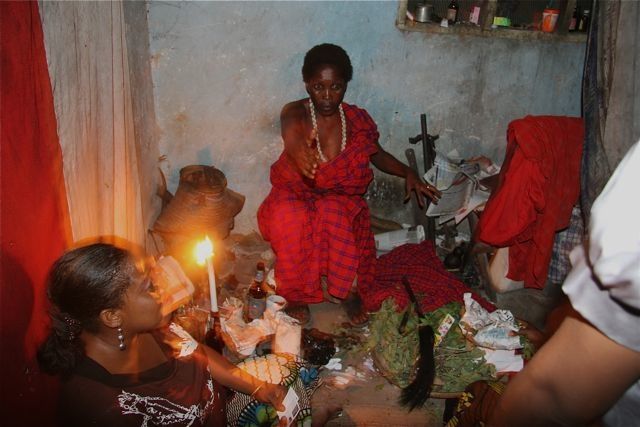“Witch doctor” is clearly not a Swahili term. But that is what the woman yells, over and over, stomping in place and drinking from a plastic pouch labeled “Premium Vodka.”
Fatuma Ali wears a red-and-blue-checked cloth, belted toga-style around her body. Between slurps of vodka, she cracks open a bottle of lager with her teeth and gulps that too. From the back corner of the room, her husband, Richard Lawile, a soft-spoken former truck driver, explains that five male jinni, or spirit-personalities, take turns inhabiting his wife’s body and speaking to her clients. These jinni include a German soldier, an Arab trader, and the one we’re seeing now, a Masai warrior. Fatuma spends so much time in this state, her followers call her simply “Masai.”
In the gathering dark, five of her devotees are packed into a room the size of two portable toilets. Two slip outside when Fatuma invites my translator and me to enter. Among those who remain, her eyes glassy and unfamiliar, is Neema John, the woman I have come to Tanzania to find.
Two years ago, I visited Dar es Salaam and wrote about this young refugee’s struggle to be reunited with her family in the U.S . This January, she and her son got permission to go. But they haven’t. February and March deadlines have come and gone. Officials say there’s a chance they can extend these if she gets busy completing her medical checkup and visa interview, but she’s shown no sign of eagerness.
Instead, say officials at the agencies trying facilitate her move–the U.S. Embassy, UNHCR (United Nations High Commissioner for Refugees, the UN refugee agency), and International Organization for Migration (IOM)–she has repeatedly broken promises to show up, and goes weeks between contacts. Her parents say they don’t know why, and agency officials are dumbfounded. A refugee passing on a chance for a new life in America is so rare, says UNHCR legal advisor Ron Mponda, “it’s like a falling star.”
Yet Neema seems likely to do so. I have come to Dar es Salaam to learn why. On this first day, my search has led here, to a tin-roofed cinderblock house in a muddy bottom in the slum of Keko.
Tanzanians know Keko as the city’s busy furniture district. But past the velour sofas and carved cabinets along the main road, footpaths wind back into an area remarkable for its squalor. Keko makes Neema’s low-income neighborhood of Kigogo–a hilly collection of homes built on a city dump, but at least with clean latrines, a fruit and vegetable stand, a convenience shop, several tailors and a water pump–look middle-class.
It’s not just that trash is everywhere in Keko—the trees and grass seem to be growing out of it, the stream-bottom made of it, and a fetid stench rises from everything. To get to Fatuma’s house, you walk along this stream, cross a precarious log bridge, duck between the sties of several enormous sows and emerge into a yard of sucking mud.
Tony Joseph, Neema’s 6-year-old son, leads us there. In the yard, we meet his mother. Neema hugs me, but shows no emotion at my unannounced visit. She is followed out of the house by Fatuma, who welcomes me and ushers me in.
There, her Masai personality gives way to the German one, who speaks in a jumble of syllables that Richard tells us are German and English words. They are not, but they sound close enough to satisfy the Swahili-speakers on the floor, who light candles and pay small sums as Fatuma cracks open another beer.
This is not a story I’m eager to tell. In 2009, a spate of killings and maimings of Tanzanian albinos (whose body parts are prescribed by some traditional healers to bring clients financial success) focused western media attention on the country’s witch doctor problem. In response, the government banned all “traditional healers,” making no distinction between professional herbalists, those few involved in the killings, and small-time con artists like Fatuma. The ban was recently lifted, but inevitably much of the coverage fed stereotypes about African backwardness and exoticism.
Africans especially are disappointed by this portrayal, says Dr. Simeon Mesaki, a lecturer at the University of Dar es Salaam who has studied the issue of witchcraft in Tanzania for more than 30 years. Over lunch, later in the week, I describe to him the scene at Fatuma’s house.
“She’s a quack,” he says; true traditional healers are professionals who would never drink on the job. He estimates 80 percent or more of the country’s practitioners of witchcraft fall into Fatuma’s category.
Sitting in Fatuma’s house the first night, though, I’m struck not by her strangeness, but by her familiarity. I’ve met her kind before: in prisons, in small-town America, anyplace a person with confidence can cobble together a repertoire of pretense and manipulation to prey on worse-educated or more desperate people.
But amid her quackery, Fatuma also has a certain insight. Later in the week, when relations between us sour, she would accuse me of coming to Tanzania “just to help myself” by writing a story–not to help Neema. As proof of my good intentions, Fatuma demands a $500 payment–for Neema, of course. Though I do make a $10 “contribution,” she’s right that I have no intention of paying her a larger sum.
But she’s wrong that I don’t want to help. We just could not have more different conceptions of what that means.
